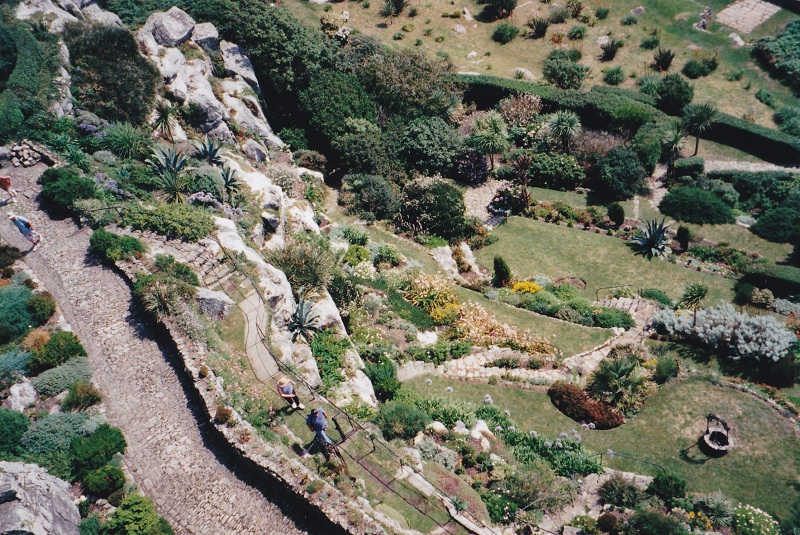
“For he did not despise or abhor the affliction of the afflicted; he did not hide his face from me, but heard when I cried to him (Psalm 22:24). Pictured here is the garden at St. Michael’s Mount, Cornwall, which for some reason reminds me of the Garden of Gethsemane. Photo credit JAT 1997.
A: Tell me more about the practice you taught of “taking up the cross.”
J: We got a little side-tracked last time, didn’t we?
A: As usual. No straight lines around here. Always curves and meandering paths.
J: Funny how the clearest and truest path to the heart is never straight.
A: It took me a long time to figure this one out. But there’s so much freedom, so much peace, in understanding that love isn’t linear and isn’t supposed to be. It has its own strange rhythms. But in the end it’s stronger than anything I’ve ever known. It’s so . . . so . . . strong. It’s so complex. It’s not a pure strand of anything. It’s this amazing tapestry, as you’ve described it before. A tapestry with so many colours and so many songs and so many tears. All woven together into this picture, this portrait, of life. Life filled with passion and wonder and awe. Life where you’re constantly surprised. But also life where you don’t mind being surprised.
J (nodding): It’s very important, the idea of being surprised and not minding. It’s the “not minding” part that sets apart a person who’s listening to his/her soul and a person who’s not. The soul doesn’t mind surprises. The brain’s Darwinian Circuitry hates surprises. You can tell a great deal about a person’s brain health in the small moments when surprise strikes. The soul takes these unexpected events in stride. The Darwinian Circuitry seizes up and panics and can’t take swift, wise action. The soul continues to be able to act during a crisis. The Darwinian Circuitry comes to a grinding halt.
A puzzling thing happens when the Darwinian Circuitry panics. Inside the brain there’s a sudden “disconnect” between the decision-making centres and the movement centres. People literally freeze like a deer in the headlights. This is when they’re most vulnerable to lies — to words spoken aloud with authority by people who are in a position of trust. This is when mobs can be persuaded to riot. But it only works — and I want to emphasize this — it only works when people have already panicked. It only works when people have stopped listening to their own souls. You can’t force people who are listening to their own souls to join a mob. They won’t do it. They find no pleasure and no safety in the ridiculous idea that’s floating around of “homo duplex.” Mob mentalities — hive mentalities — are dangerous to the goals of healing, peace, and redemption. Mob mentalities lead to Crusades. Crusades are never a positive thing in the eyes of God or God’s angels.
A: It’s interesting how individuals stop taking personal responsibility for their own actions when they’ve agreed to hand over their own free will to a mob leader.
J: For those who can’t hear the inner wisdom of their own soul, it’s a relief to hand over their free will to somebody else.
A: It’s a difficult process, reclaiming your own free will. (Sighhhhh.)
J: Yes. There’s probably no greater challenge for a human being. Nonetheless, it’s the challenge that all human beings are called to. They must wrestle with what it means to have free will. They must question it, be confused by it, be angry at it, reject it, and finally come to terms with it.
A: What you just said reminds me of the stages of grief.
J: That’s exactly what the process is. It’s an experience of working through grief. And, by god, you need forgiveness to get you through it, because somewhere in the middle of the process you’re going to come face to face with the reality of all the times when you didn’t apply your free will in loving and trusting ways. You’re going to feel like a shit. This is where forgiveness sees you through. Forgiveness is the act of free will that allows you to keep going, to get up the next day and keep going even when you’ve stopped denying the harm you’ve created here on Planet Earth.
A: This is where you really need a mentor.
J: Yes. You need to know that somebody else has already forgiven you so you can find the courage to forgive yourself.
A: That mentor can be God.
J: Yes. If a person trusts that God the Mother and God the Father forgive her even when she’s been a shit, she can lean on their strength as she struggles to learn from her mistakes and forgive herself. It takes time to learn to forgive, but that’s okay. People have to believe that God doesn’t expect instant results. Indeed, instant results aren’t scientifically supportable or biologically possible. God only expects consistent effort. God will help you if you’re willing to make a consistent effort to be the best person you’re capable of being.
A: Warts and all.
J: God doesn’t mind warts. Human beings end up covered in warts and scars and cracked bones and broken hearts in their time on Planet Earth. God forgives you anyway. I can’t emphasize this enough. God sees past all the warts and scars and cracked bones and looks straight into your broken heart. You can’t hide a broken heart from God. Nor should you want to.
A: It’s so difficult for regular human beings to believe they’re worthy of God’s daily forgiveness. I really struggled with this in the beginning. But I’m glad you persisted!
J: It changes everything when you’re willing to accept God’s forgiveness. Everything. You find the freedom to move — really move. So instead of being nailed helplessly to the cross, immobile, desperate, unable to flow with the changes and surprises of each day, you begin to be able to move. Sure, at first you have to drag the damn cross with you, and it’s heavy, and it hurts. But at least you’re moving! And you’re starting to reclaim your sense of your own self, your own true potential. After a while the cross you’re dragging around starts to feel different to you. It starts to feel less like a heavy burden and more like . . . gravity. A place where you can feel the weight, the seriousness, the reality of honest truth and not be afraid of it. A place where honest truth is your ally, your very foundation. Your centre of gravity.
A person who has chosen to pursue status (“gaining the whole world” at the expense of honest truth) relates strongly to the image of the crucifix — Jesus nailed to the Cross — because this is the way he or she feels in relation to the world and to God. He feels trapped. Nailed down. Impoverished of health and happiness. Stuck in an endless circle of pain and self-sacrifice. So he thinks the image of the crucifix is right.
By contrast, a person who has chosen the path of knowing free will, love, forgiveness, healing, and redemption sees the cross in very different terms. He sees a symbol of freedom from the self-enslavement of status addiction, a symbol of the courage to be yourself and know yourself and trust yourself in a world that tells you this is impossible.
To be disenfranchised from Empire is not necessarily a bad thing.



